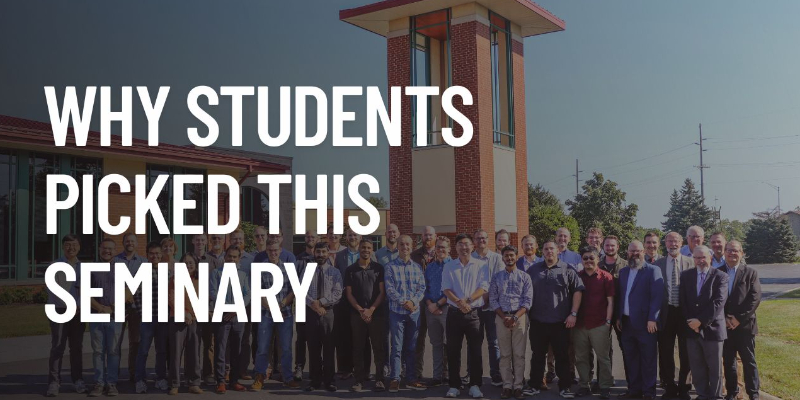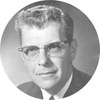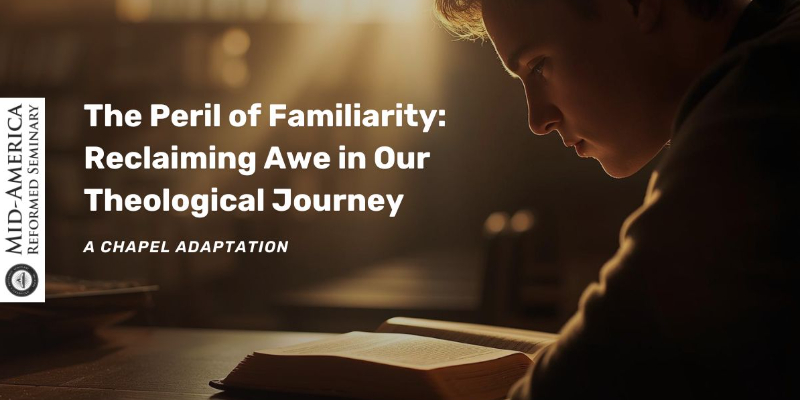
Answering Objections to Catechism Preaching Part 3
The following article has been adapted from the 1986 edition of the Mid-America Journal of Theology.
More serious than every other objection raised against such catechetical preaching, however, seems to be the one that challenges its very legitimacy.
Here, so the argument runs, the words of men are substituted for the word of the Lord. Every sermon must have as its "text" a verse or passage taken word-for-word from the Bible.
Here, we believe, are palpable and patent misunderstandings that need to be cleared away. Not only does this reveal a simplistic and biblicistic view of Scripture, but it also springs from a strange and erroneous conception of preaching. Neither of these notions will serve believing congregations well.
No sermon—and on this, all will have to agree—is simply a verbatim recitation of a large number of biblical texts. If this is what our Lord had wished, he would never have ordered his apostles to "preach" and "teach." Nor would he have said to them after speaking his parables, "Therefore every teacher of the law who has been instructed about the kingdom of heaven is like the owner of a house who brings out of his storeroom new treasures as well as old" (Matt 13:52). In a similar vein Paul urged Timothy, "Do your best to present yourself to God as one approved, a workman who does not need to be ashamed and who correctly handles the word of truth," supplementing this with the command, "Preach the Word, be prepared in season and out of season; correct, rebuke, and encourage—with great patience and careful instructions" (2 Tim. 2:15; 4:2). These and many other passages demonstrate that the gospel is to be explained and applied to those who hear.
To this must also be added that "the whole will of God" is to be set forth.
This is by no means limited to a few outstanding verses or chapters in the Bible. Nor did God's self-revelation in Scripture, now entrusted to his church for preservation and propagation, fall in a single day from the heavens. Instead, over many centuries, making use of servants selected and inspired by him, God has declared his ways and will. This he was pleased to do progressively, always addressing people in their life situations and yet so that his truth is authoritative and valuable for all men everywhere. Nor did this produce a Bible (somewhat like the Koran) containing a series of unconnected and perhaps even contradictory statements, theories, or "theologies," as some would claim. In all its teachings, a most remarkable unity demonstrates that the human authors were indeed superintended by the Holy Spirit. No section simply repeats what had been set down earlier. We always encounter new, richer, fuller revelations which complement and supplement what God had declared before.
Only when this is seen will a preacher avoid like a plague preaching on any "text" in isolation from its immediate context and the total message of Scripture. We dare not expound on Old Testament passages as do the Jewish rabbis. Nor should we isolate the psalms and the prophecies from their historical context. Even the significance of the four Gospels is not clarified apart from some reference to the doctrines set forth in the apostolic sermons and writings. The terms so repeatedly used like "God," "man," "sin," "deliverance," "grace," "faith," and a host of others take on richer coloration and clarity as we study, step by step and book by book, this marvelous word of the Lord. Only together do they begin to display "the manifold wisdom" (Eph. 3:10) of the God who saves and uses the church to the praise of the glory of his grace. Our high calling as a redeemed and refreshed people—and how often do we make the congregations aware of this?—is to "reflect" all this not only before the world but above all before "the rulers and authorities in the heavenly realms." Even preachers and people who exercise themselves daily in the Word have seen only "the fringes of God's ways." Most of us are little advanced beyond kindergarten in the school where Christ enrolled us.
What all believers, therefore, need for enrichment of their spiritual understanding and experience is a sum of every basic teaching necessary for full salvation that the Bible gives. According to the testimony of Reformed churches in many lands also today, the Heidelberg Catechism provides this. For that reason, its responses are replete and resonant with biblical terms, phrases, and even sentences, all while striving to explain that believers can respond to what God has said with heart, mouth, and deed. When done as its composers intended, such preaching shows more clearly than sermons based on a single verse or passage far more of the length and breadth and depth of the treasures displayed on the sacred page. These we are to teach people to "see" with the Spirit-enlightened eyes of their understanding.
Let us no longer be ashamed, if such we are, of using the questions and answers of this catechism as "texts" for our sermons. Nor should a single Bible verse or two be added to serve as an apology or even a basis for such a message.
This matter has been debated from time to time in the Reformed churches. Echoes of it are even heard occasionally in our own time.
To it, few have addressed themselves more clearly and persuasively than did Abraham Kuyper in a series of articles in De Héraut years ago. His explanation still deserves thoughtful consideration:
"When our catechism was composed, it was understood at once that the testimonies of Scripture might not be omitted from such a catechism. But how were these supplied? Did they (i.e., the authors) place at the head of each Lord's Day a text from which that entire Lord's Day was deduced? Indeed not; rather, sometimes twelve or more declarations of Holy Scripture were included with each answer, thereby to demonstrate that only the gathering together of that which was revealed in all these statements produced the result arrived at. In sharp contrast this organic conception of Holy Writ was afterward forsaken and the practice introduced of selecting a single text for the catechetical sermon. This was, indeed, a step backward ...
Our fathers rightly understood that the systematic proclamation of the basic teachings of our confession is only possible when the truth is drawn from not one but from ten or twelve texts and all of these together. Therefore catechetical preaching for them was not no-preaching according to Scripture, but preaching on all these texts which were deliberately placed under each answer. The enumeration of texts therefore is not incidental but essential. It is not: so also does Holy Scripture think about this matter, but: from these and these veins of the Bible this gold has been mined."
To a casual and somewhat uncritical listener, this may seem to be a "topical" preaching that the Reformed have usually deplored. Yet it stands at the farthest remove from what usually passes for such sermons today. The subject or "theme" here derives directly and inescapably from Scripture itself. Never is it left to the choice of either preacher or people to determine what subject shall be explained. Nor is only the subject assigned. Rather, what and how and in what order and frequently why this, and not something else, is to be expounded and applied has been carefully crafted, all in dependence on and in conformity with what Scripture in several places unmistakeably affirms.
Such, then, can become biblical preaching at its best.
It allows none of the essentials of God's gospel of salvation to be ignored in the course of a year or two.
It safeguards against having ministers selecting only those materials from the Bible or elsewhere, which may please them at some given moment.
It assures God's people that the Word itself, as the first key of the kingdom of heaven, shall be explained as clearly, fully, and effectively as is humanly possible. Here they can receive a spiritual diet both adequate and balanced in its life-directing power.


P.Y. De Jong (1915-2005) was one of the founding members and former professor at Mid-America Reformed Seminary.
Recent articles




